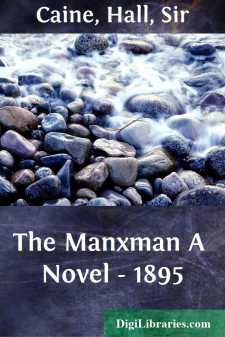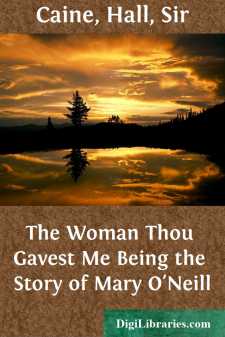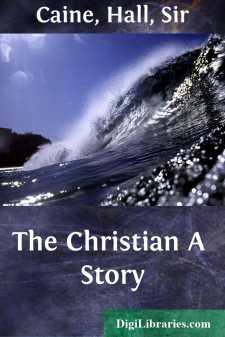Categories
- Antiques & Collectibles 13
- Architecture 36
- Art 48
- Bibles 22
- Biography & Autobiography 813
- Body, Mind & Spirit 142
- Business & Economics 28
- Children's Books 14
- Children's Fiction 11
- Computers 4
- Cooking 94
- Crafts & Hobbies 4
- Drama 346
- Education 46
- Family & Relationships 57
- Fiction 11829
- Games 19
- Gardening 17
- Health & Fitness 34
- History 1377
- House & Home 1
- Humor 147
- Juvenile Fiction 1873
- Juvenile Nonfiction 202
- Language Arts & Disciplines 88
- Law 16
- Literary Collections 686
- Literary Criticism 179
- Mathematics 13
- Medical 41
- Music 40
- Nature 179
- Non-Classifiable 1768
- Performing Arts 7
- Periodicals 1453
- Philosophy 64
- Photography 2
- Poetry 896
- Political Science 203
- Psychology 42
- Reference 154
- Religion 513
- Science 126
- Self-Help 84
- Social Science 81
- Sports & Recreation 34
- Study Aids 3
- Technology & Engineering 59
- Transportation 23
- Travel 463
- True Crime 29
The Bondman A New Saga
by: Hall Caine
Description:
Excerpt
Proem.
There is a beautiful Northern legend of a man who loved a good fairy, and wooed her and won her for his wife, and then found that she was no more than a woman after all. Grown weary, he turned his back upon her and wandered away over the mountains; and there, on the other side of a ravine from where he was, he saw, as he thought, another fairy, who was lovely to look upon and played sweet music and sang a sweet song. Then his heart was filled with joy and bitterness, and he cried, "Oh, that the gods had given me this one to wife and not the other." At that, with mighty effort and in great peril, he crossed the ravine and made towards the fairy, and she fled from him; but he ran and followed her and overtook her, and captured her and turned her face to his face that he might kiss her, and lo! she was his wife!
This old folk-tale is half my story—the play of emotions as sweet and light as the footsteps of the shadows that flit over a field of corn.
There is another Northern legend of a man who thought he was pursued by a troll. His ricks were fired, his barns unroofed, his cattle destroyed, his lands blasted, and his firstborn slain. So he lay in wait for the monster where it lived in the chasms near his house, and in the darkness of night he saw it. With a cry he rushed upon it, and gripped it about the waist, and it turned upon him and held him by the shoulder. Long he wrestled with it, reeling, staggering, falling and rising again; but at length a flood of strength came to him and he overthrew it, and stood over it, covering it, conquering it, with his back across his thigh and his right hand set hard at its throat. Then he drew his knife to kill it, and the moon shot through a rack of cloud, opening an alley of light about it, and he saw its face, and lo! the face of the troll was his own!
This is the other half of my story—the crash of passions as bracing as a black thunderstorm.
In the latter years of last century, H. Jorgen Jorgensen was Governor-General of Iceland. He was a Dane, born in Copenhagen, apprenticed to the sea on board an English trader, afterwards employed as a petty officer in the British navy, and some time in the command of a Danish privateer in an Alliance of Denmark and France against England. A rover, a schemer, a shrewd man of affairs, who was honest by way of interest, just by policy, generous by strategy, and who never suffered his conscience, which was not a good one, to get the better of him.
In one of his adventures he had sailed a Welsh brig from Liverpool to Reykjavik. This had been his introduction to the Icelandic capital, then a little, hungry, creeping settlement, with its face towards America and its wooden feet in the sea. It had also been his introduction to the household of the Welsh merchant, who had a wharf by the old Canning basin at Liverpool, a counting-house behind his residence in Wolstenholme Square, and a daughter of five and twenty. Jorgen, by his own proposal, was to barter English produce for Icelandic tallow. On his first voyage he took out a hundred tons of salt, and brought back a heavy cargo of lava for ballast. On his second voyage he took out the Welshman's daughter as his wife, and did not again trouble to send home an empty ship.
He had learned that mischief was once more brewing between England and Denmark, had violated his English letters of marque and run into Copenhagen, induced the authorities there, on the strength of his knowledge of English affairs, to appoint him to the Governor-Generalship of Iceland (then vacant) at a salary of four hundred pounds a year, and landed at Reykjavik with the Icelandic flag, of the white falcon on the blue ground—the banner of the Vikings—at the masthead of his father-in-law's Welsh brig.
Jorgen Jorgensen was then in his early manhood, and the strong heart of the good man did not decline with years, but rode it out with him through life and death. He had always intended to have a son and build up a family. It was the sole failure of his career that he had only a daughter. That had been a disaster for which he was not accountable, but he prepared himself to make a good end of a bad beginning. With God's assistance and his own extreme labor he meant to marry his daughter to Count Trollop, the Danish minister for Iceland, a functionary with five hundred a year, a house at Reykjavik, and another at the Danish capital.
This person was five-and-forty, tall, wrinkled, powdered, oiled, and devoted to gallantry. Jorgen's daughter, resembling her Welsh mother, was patient in suffering, passionate in love, and fierce in hatred. Her name was Rachel....












